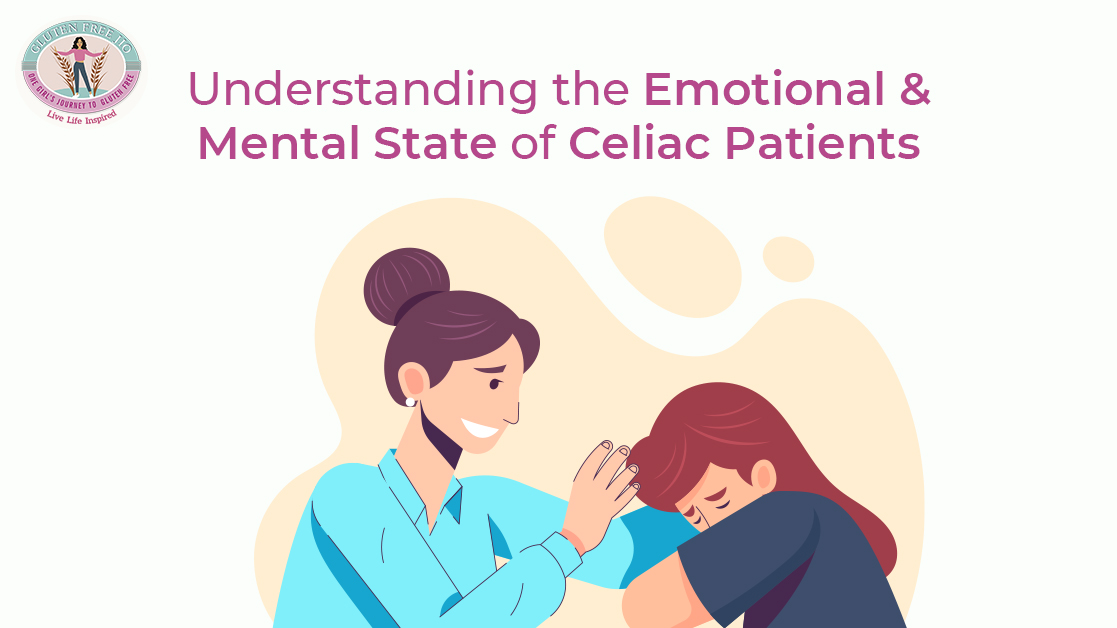Understanding the Emotional & Mental State of Celiac Patients

Dealing with celiac disease can be a real struggle. It causes you to have a weaker immune system and learning how to handle this can be very difficult physically and mentally.
I strongly believe that anybody who is suffering from celiac disease or knows someone who is gluten-sensitive, has had or is in the middle of an emotional journey.
It is natural for emotional imbalances to accompany health problems; after all, confronting any disease requires major lifestyle changes. Adapting to this changed lifestyle begins with an awareness of your emotions and knowing how to control them.
Here are the 10 different phases of the emotional journey that every celiac faces
Before we begin, it is necessary to understand that the mental health of celiac patients differs from person to person. This can be due to varying circumstances, levels of gluten sensitivity, and other day-to-day struggles.
1. Insecurity & Doubts
One emotion that most celiac patients face is insecurity and doubt. This comes from the uncertainty people face when visiting new places, while traveling, even going to your favorite local restaurant. A major problem that provokes such insecurity is the lack of awareness about celiac disease as a medical condition. Many people believe being gluten-free is a personal preference.
To cope with these situations, many celiac patients prefer to bring their own food when traveling or visiting relatives. It is often hard to control these feelings as you don’t want to have an allergic reaction or deal with other health complications that come from cross-contamination or direct consumption of food with gluten.
Related Read: Traveling Gluten-free: Here’s How to Make the Most of Your Next Trip
2. Distrust
People with celiac or gluten sensitivity may have feelings of distrust. This can arise when you are not sure whether the food is gluten-free, even if your meal happens to be a simple fruit salad or a piece of chicken. Distrust also originates when people make fun of those who stick with a medically prescribed diet to improve their health.
To be considered ‘different’ or be the reason others may laugh can make anyone feel alone, embarrassed, and betrayed, nurturing feelings of distrust.
3. Anger
Anger is a common feeling for people, even animals. As a result, many celiacs also experience this. Initial stages could include annoyance and frustration, triggered by the smallest of things like getting a meal served late. Even the sense of discomfort that arises from eating in front of people can transform into anger quickly.
4. Anxiety
Though celiacs are free to do almost any activity they like, they often face some form of anxiety. For me, it came with traveling to new places. I used to be very anxious about where I could eat. Even if you carry your own food during flights, you are likely to feel anxious about possible cross-contamination on surfaces.
5. Worry
Most of us worry about our future and it becomes especially prominent when you are suffering from celiac disease. The thought of your body getting weak with age naturally causes stress. Moreover, people also have concerns about their children being gluten-sensitive or their bodies losing immunity against other health problems.
6. Sadness
Becoming sad is natural when you find yourself different from other people. It is the feeling of not being normal and can haunt you when you travel. Imagine that you are sitting at a restaurant when everyone else is having a full meal, and you found yourself waiting for the one gluten-free item on their menu or you are eating sides or parts of the cuisine served at the table.
It can be isolating and make you feel sad. It can also bother you if others feel bad for you as you can’t simply go out and pick something easily from a menu. Moreover, you may even start to avoid outings or may feel more left out if you force yourself to participate in social gatherings.
7. Relief
When you deal with celiac disease routinely and work to overcome negative emotions like sadness, anger, or worry, you tend to develop a feeling of relief.
This relief comes from the feeling of satisfaction that you gain by being in control of your lifestyle without requiring medical support. It can be a feeling of content that your condition, while you manage it, will not cause major complications or turn into a fatal situation.
It really feels good!
8. Shame
One can feel ashamed of their condition, especially because a lack of awareness has transformed it into a social stigma. People who are unfamiliar with your condition often tend to misinterpret your personality and behavior. Some may consider eating gluten-free meals and being cautious of cross-contamination as a selfish or unnecessary practice. This feeling of shame does not come from your health conditions but from the stigma attached to it–the thought that those who prefer gluten-free foods r are arrogant, high-maintenance, and/or selfish.
9. Jealousy
It is completely normal to feel jealous. When you are suffering from celiac disease, you often envy others eating delicious food from different cuisines across the world. Besides, the long conversations that you need to have with waiters when you visit a restaurant can be annoying and frustrating while your friends are ordering items without any explanation.
10. Kindness
The best part about being a celiac is meeting people who care for you, and who understand your concern and worries. In my case, it was my family and friends who stood by my side whenever I felt low. Even when I visit my friends, their parents always make or order gluten-free food for me. At home, my family would always make compromises to make me feel normal. I truly appreciate these small gestures.
Take Away
Life is very challenging and it brings along a sea of emotions, especially if you are suffering from health conditions. As time passes, you learn to navigate through these challenges–things do become easier as you rise beyond any limitations. After all, you are a fighter. Always remember that you are not alone, and hopefully, like me, you will learn to be happy with the life that you were given.
 MY JOURNEY
MY JOURNEY About Me
About Me Early life
Early life Diagnosis
Diagnosis CELIAC DISEASE
CELIAC DISEASE Symptoms & Diagnosis
Symptoms & Diagnosis Treatment & Follow Up
Treatment & Follow Up GLUTEN - FREE LIVING
GLUTEN - FREE LIVING At Home
At Home At School
At School At Social Events
At Social Events
 Grocery Shopping
Grocery Shopping COMMUNITY OUTREACH
COMMUNITY OUTREACH Gluten Free Meetup
Gluten Free Meetup Workshops
Workshops Webinars
Webinars COVID-19 Camps By Gluten Free Jio
COVID-19 Camps By Gluten Free Jio  Mid Day Meal
Mid Day Meal Beyond Celiac
Beyond Celiac Real Stories of Celiac
Real Stories of Celiac RESOURCES
RESOURCES Restaurant Dining Cards
Restaurant Dining Cards Recipes
Recipes Gluten Free eBook
Gluten Free eBook Gluten Free Jio App
Gluten Free Jio App RECOGNITION
RECOGNITION TRAVEL DIARY
TRAVEL DIARY



